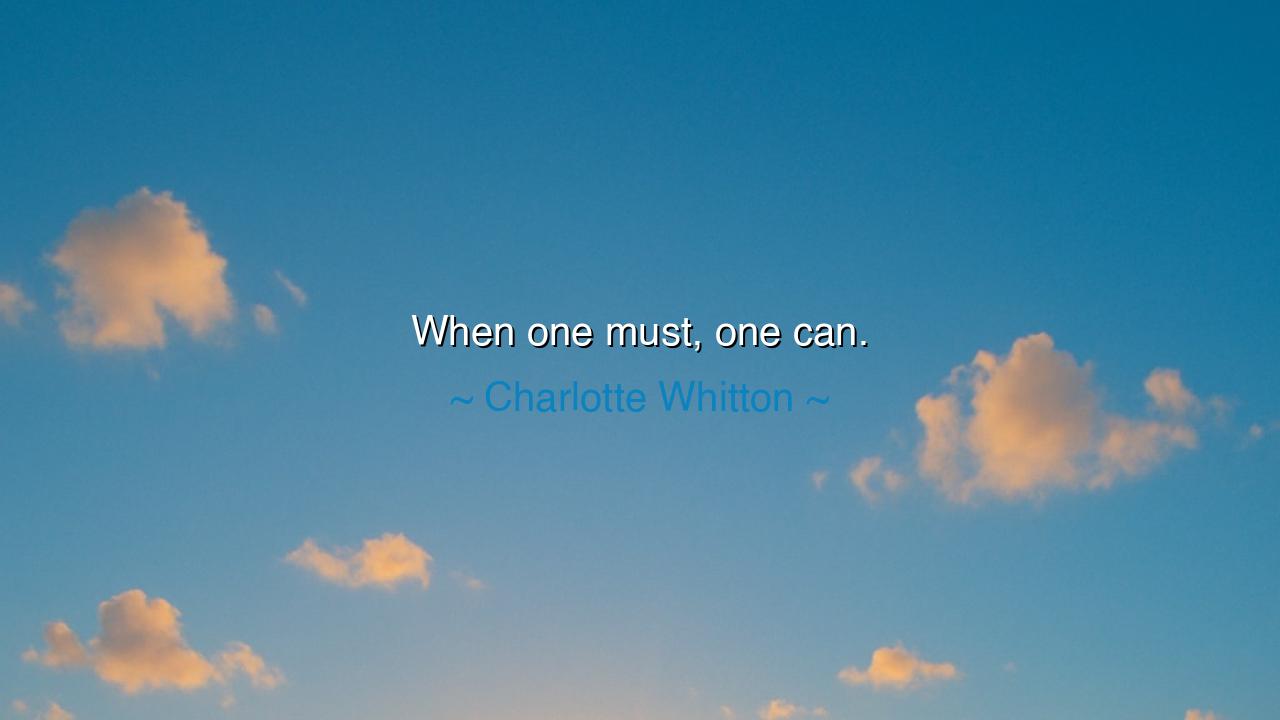
When one must, one can.






In the words of Charlotte Whitton, a pioneer of leadership and a woman who shattered barriers in her time, we hear a truth sharp and undeniable: “When one must, one can.” These words are not the idle comfort of the easy road, but the hard wisdom of those who have walked through necessity and discovered hidden strength. They speak to the mysterious power of the human spirit—that when fate corners us, when retreat is cut off, when survival or honor demands it, we rise with abilities we did not know we possessed.
The origin of this wisdom lies in the observation of life itself. Whitton, the first female mayor of a major Canadian city, lived in an era when women were told what they could not do. Yet when history demanded leadership, she stepped forward. She did not wait for perfect readiness, for none is ever perfectly ready. Instead, she embodied the law she spoke: necessity awakens power. We think ourselves weak until the moment comes when weakness is not an option. Then, we act—and in acting, we discover strength.
History abounds with testimony to this principle. Think of Winston Churchill in the dark days of 1940. Britain stood alone, the shadow of Nazi conquest looming across Europe. Many feared collapse, yet Churchill declared, “We shall fight on the beaches… we shall never surrender.” In that hour of dire necessity, he and his people found courage that surprised even themselves. When they must, they discovered they can. Their survival was not a gift, but the fruit of necessity pulling forth untapped reserves of resolve.
The ancients also honored this truth. The tale of Leonidas and the 300 Spartans at Thermopylae tells of men faced with impossible odds. They could not flee, for their honor and their land demanded defense. And so they stood, holding the pass against a vast host, their courage blazing brighter because no alternative remained. They must resist—and so they could. Though they fell, their stand inspired all of Greece, proving that necessity sharpens human will to the edge of heroism.
The meaning of Whitton’s words is this: do not underestimate what you are capable of. Comfort often makes us timid, but when life presses us, the soul awakens. Within each person lies a greater strength than they imagine, but it is often hidden until summoned by need. Fear whispers, “I cannot,” yet necessity answers, “You must—and therefore you will.” It is in these crucibles of trial that true character is forged.
The lesson for us is clear: do not wait for dire necessity before you learn this truth. Begin now to train your spirit. Push yourself into challenges that seem beyond your reach, so that when life demands your utmost, you are already prepared. And when fate does press upon you, remember Whitton’s words—let them steady your heart. You may tremble, but you are stronger than you know. When one must, one can.
Practical counsel is this: when faced with a task that seems impossible, reframe it in the language of necessity. Tell yourself, “I must do this, therefore I can.” Break the task into smaller steps, but never surrender the conviction that necessity itself fuels ability. Keep a record of past struggles you have overcome, so that in moments of doubt you may remember: you have done what once seemed impossible. This remembrance will strengthen you for the trials ahead.
Thus, Whitton’s words shine as a torch across generations: “When one must, one can.” They remind us that the human spirit is never fully known until tested, that we are capable of more than we dare to believe. Children of tomorrow, take this teaching into your hearts. Do not shrink from the storms of necessity—embrace them, for they will reveal your true power. And when the world presses you to the wall, speak this ancient creed: Because I must, I can.






AAdministratorAdministrator
Welcome, honored guests. Please leave a comment, we will respond soon